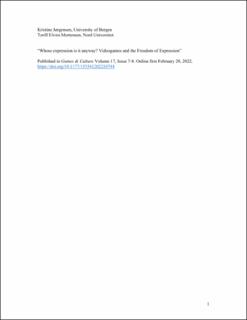| dc.contributor.author | Jørgensen, Kristine | |
| dc.contributor.author | Mortensen, Torill Elvira | |
| dc.date.accessioned | 2022-11-15T14:22:44Z | |
| dc.date.available | 2022-11-15T14:22:44Z | |
| dc.date.created | 2022-03-01T12:20:59Z | |
| dc.date.issued | 2022 | |
| dc.identifier.issn | 1555-4120 | |
| dc.identifier.uri | https://hdl.handle.net/11250/3031973 | |
| dc.description.abstract | In debates concerning videogames and the freedom of expression, two lines of argumentation have traditionally been put forward: That games express ideas and for this reason are entitled to the same protection as other expressive media or that their interactive nature makes them different in how they reflect the world compared to other media. This paper adds nuance to this discussion through two arguments. First, we argue that videogames cannot be understood as mainly expressive or interactive, but that these characteristics must be understood in tandem if we are to understand the role of videogames in culture and society, connected by the player. Second, we argue that play and playfulness are ignored in debates about videogames and the freedom of expression, and that attention towards the playful aspects offers a better view of how videogames differ from other media and what this means for the status of expressions in videogames. | en_US |
| dc.language.iso | eng | en_US |
| dc.publisher | SAGE | en_US |
| dc.title | Whose Expression is it Anyway? Videogames and the Freedom of Expression | en_US |
| dc.type | Journal article | en_US |
| dc.type | Peer reviewed | en_US |
| dc.description.version | acceptedVersion | en_US |
| dc.rights.holder | Copyright 2022 the authors | en_US |
| cristin.ispublished | true | |
| cristin.fulltext | postprint | |
| cristin.qualitycode | 2 | |
| dc.identifier.doi | 10.1177/15554120221074423 | |
| dc.identifier.cristin | 2006666 | |
| dc.source.journal | Games and Culture | en_US |
| dc.source.pagenumber | 997-1014 | en_US |
| dc.identifier.citation | Games and Culture. 2022, 17 (7-8), 997-1014. | en_US |
| dc.source.volume | 17 | en_US |
| dc.source.issue | 7-8 | en_US |
